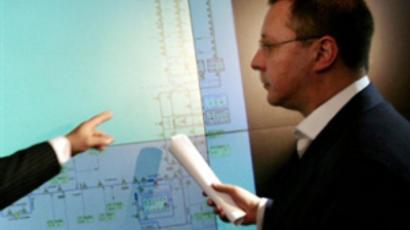ROAR: Russia, Ukraine enter new controversy over South Ossetia

Russian prosecutors have accused Ukrainian troops and members of a nationalist group of fighting against South Ossetia in 2008. Analysts fear this will add to the tension between Moscow and Kiev.
Ukraine’s regular Defense Ministry units and some 200 members of the UNA-UNSO nationalist organization took part in Georgia’s military aggression against South Ossetia, the investigation department of the Russia’s Prosecutor General's Office said.
Uniforms, photographs and documents of Ukrainian troops and nationalists were found after the war in Georgia last year, the investigators said.
Representatives of UNA-UNSO (Ukrainian National Assembly – Ukrainian National Self Defense) said they had only expressed their vision of the conflict at the time, and they were not within Georgia’s military detachments during the fighting. Deputy Head of the nationalist group, Nikolay Karpyuk, told Interfax news agency: “Unfortunately, units of UNA-UNSO and members of the organization did not take part in the Russian-Georgian war.”
Officials in South Ossetia were the first who spoke, in September 2008, about the participation of Ukrainian nationalists in the war. Russian investigators first mentioned this topic in November 2008.
The participation of Ukrainian nationalists in the war is not news, some analysts said. “Those who fought in Georgia spoke about this, and members of this radical organization boasted that they assisted the Georgians,” Sergey Mikheev, vice president of the Center for Political Technologies, said.
“It's quite another matter that their assistance was fairly insignificant,” Mikheev told Gazeta daily. He noted that Ukrainian nationalists fought on the separatists’ side during the first war in Chechnya. “So, there is nothing strange in the fact that they decided to take part in the last year’s conflict,” Mikheev added.
“The participation of the militants from UNA-UNSO in the conflict can be explained by their own initiative,” Aleksey Vlasov, general director of the Information and Analytical Center of the Moscow State University told Gazeta daily.
Mikhail Pogrebinsky, head of the Kiev Center of Political and Conflict Studies said that UNA-UNSO is now “a virtual organization, a phantom. We all understand that they do not have any capabilities, not only to organize participation in a military operation, but even to find a hundred people for this,” he told Nezavisimaya Gazeta daily.
“If it were not for this fact, the words about the existence of evidence of Ukrainians taking part in the war in the Caucasus might have been taken as sensationalism,” Pogrebinsky said.
Head of the Executive Committee of the Center for Applied Political Studies “Penta”, Vladimir Fesenko, also expressed his doubts about 200 members of UNA-UNSO assisting Georgians. He told Interfax-Ukraine news agency that the organization would hardly gather so many activists “in the whole of Ukraine.”
Moscow has long been accusing Kiev of supplying arms to Tbilisi and pursuing hostile policies against Russia. At the same time, the accusations about Ukrainian troops taking part in Georgia’s aggression are a new turn, many analysts and newspapers note.
“It seems that [the investigation department] reacted in this way to Russian President Dmitry Medvedev’s message to his Ukrainian counterpart Viktor Yushchenko,” Vremya Novostey daily wrote. Yushchenko, who replied to Medvedev earlier, this time did not respond to the new accusations, the daily said.
However, the Ukrainian general staff immediately denied the statements of Russian investigators, calling them “propaganda.”
Statements about the participation of Ukrainian servicemen are not new, nor are those about nationalists, Mikheev believes. “Ukrainian military instructors managed crews of S-300 missile systems which shook down Russian aircraft,” he added. “As a matter of fact, Ukraine sold those systems to Georgia.”
Vlasov, in his turn, called the statement about Ukrainian servicemen joining Georgians in the war “a serious accusation,” adding “This requires strong evidence.” Some other analysts also stress that the investigators should produce more evidence.
“If the accusation is truthful, it may become a trump card during the Ukrainian presidential campaign,” Vlasov said. “Opponents of Yushchenko may use it, because he, as the supreme commander-in-chief, should have known that Ukrainian soldiers fought against Russia.”
Vadim Karasev, director of the Kiev Institute of Global Strategy, believes that if evidence is well-documented and presented to the public, “a new wave of political struggle in Ukraine could be expected during the presidential campaign.”
“The presence of Ukrainian troops abroad and their participation in conflicts are controlled by laws and require the parliament’s permission,” Karasev told Interfax-Ukraine news agency.
A special commission of Ukraine’s parliament, which investigated “the Caucasus case” in the autumn last year, failed to find any evidence of the participation of Ukrainian servicemen in the conflict, Pogrebinsky of the Center of Political and Conflict Studies noted. At the same time, many Ukrainian officials think that former servicemen might have fought “as mercenaries on the Georgian side,” Nezavisimaya Gazeta daily wrote.
Valery Chaly, international programs director at the Razumkov Center in Kiev, said that accusations against Ukraine have been pronounced for a year now, but evidence has not been presented so far. He told Nezavisimaya Gazeta that the statements of the investigation commission show a “political rather than a judicial background.”
He also assumed that Russian prosecutors “are reinforcing Medvedev’s message to Yushchenko with arguments.” Chaly believes Russian-Ukrainian relations may continue to deteriorate in the future.
Vremya Novostey agrees that “another attempt to draw attention to the old issue may be connected with new tension between Moscow and Kiev.” Investigators have accused Ukrainian nationalists before, the paper noted, adding that this time, however, they have mentioned “some figures, and even surnames.”
Sergey Borisov, RT













